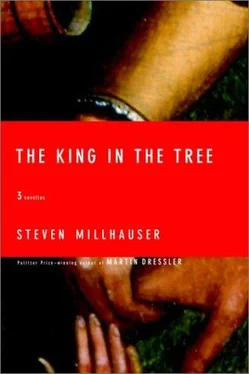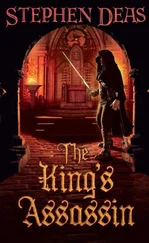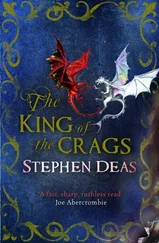The idea for a mime appears to have come from the Count, although I cannot believe that Modor did not guide him from the very beginning. It is unimportant. The Count’s love of pleasure, his need for diversion, his childlike delight in surprise, his openness to suggestion of every kind — all this was bound to present itself as a temptation to Modor’s sharp sense of opportunity, his habit of machination, his single-minded devotion to furthering his own ends. The Count’s two dwarves proved to be his way in. These are the clownish dwarves one often sees in the entourage of a great nobleman, dwarves without pride or dignity — dwarves who accept without protest their repellent destiny as the playthings of the strong. Their grotesque names were Roland and Bathsheba. They were man and wife, both skilled in small entertainments such as juggling, tumbling, and mime. A small harp had been specially constructed for him, a little set of bells for her. Modor has always detested dwarves of this kind; he quickly befriended them. The mime was to take place in the evening, after supper, when the King and the Count had returned from the hunt.
A stage was erected on the dais, surrounded by seats for the King, the Queen, the Count, and the highest nobles of both courts; all others sat on benches in the lower part of the hall. Tallow candles in iron candelabra lit the stage, bare except for a single stool on which sat an emerald-green silk cushion. When Modor appeared, gasps and murmurs sounded. His brash impudence astonished me. He wore a brilliant crimson mantle, edged with ermine — the unmistakable robe of the King. On his head sat a gilt paper crown. With ridiculous majesty he strode to the cushioned stool and sat down on that throne with his arms folded across his chest. Enter Roland and Bathsheba. He wore the jeweled mantle of Tristan; from Bathsheba’s shoulders hung the crescent-covered mantle of the Queen. Her hair, only partly concealed by a head covering, had been dyed a gaudy, brilliant yellow — the yellow of bitter laughter. Tristan le Petit led his little Ysolt to King Modor, who took her hand and gawked at her with oafish adoration. As Tristan walked away, she turned to watch him and stretched out one arm in a gesture of yearning. Now Dwarf King and Dwarf Queen leave the stage and Dwarf Tristan is seen groping his way among invisible trees. He stops, cups his ear. Ysolt appears. They embrace passionately. Beside me, the King drew in a sharp breath. On stage, King Modor appears, wearing his crown. He sees the lovers and throws off his mantle; he is wearing a white-and-gold surcoat over a shirt of ring mail. He draws his sword. Two dwarf attendants appear and swiftly arm him: they pull on the mail gauntlets, fasten his leg mail, lace his helmet, present him with a shield. Ysolt-Bathsheba gives a silent cry, presses both hands to her cheeks, and flees. Dwarf Tristan throws off his mantle: he wears an azure surcoat over a glittering hauberk. In the flamelight one can see the small interlocking rings of iron on his arms. The dwarf attendants complete his armor.
The sword fight between Modor and Roland was a brilliant piece of stagecraft. Their short but dangerous blades flashed in the light of candles, rang out in high-pitched tones, flung showers of sparks. Both dwarves were expert swordsmen— Roland more graceful, more resourceful, more constrained, as if he disdained to make a single motion more than was absolutely necessary; Modor fierce, nimble, relentless, at times awkward, a lover of the wild and unexpected motion. His eyes in the flamelight glittered like magic stones. Suddenly the edge of Modor’s sword strikes Tristan’s upper arm, cutting through the mail. Blood runs through the iron rings. Dwarf Tristan falls to one knee and drops his sword. As if maddened by the sight, Modor strikes wildly with his blade — rings of iron go spinning into the air. Suddenly he plunges his sword into Tristan’s side. Dwarf Tristan falls forward and lies face down on the stage.
Now Modor bends to unlace the helmet, swiftly removes it. He flings his own shield over his back, where it hangs by the shield strap, raises his sword in both hands, and in a single blow cuts off Roland’s head. Ladies cry out, the Count rises from his chair. Modor, his face crazed with triumph, seizes the dripping head by the hair, strides to the King, and holds it up to him. The Queen cries out, raises one arm across her eyes, and falls sideways in a swoon. The King, roused from his trance, holds the Queen awkwardly and attempts to rise. On the stage, Bathsheba utters a piercing scream.
The Count, inconsolable over the loss of his favorite dwarf, agreed to accept thirty thousand pieces of gold, three greyhound bitches, and an annual gift of grain. Modor sits chained in the tower prison. It is difficult to know which is worse: the murder of the Count’s dwarf or the humiliation of the King. The King speaks to no one. What I find interesting in these troubling events is the moment when Modor held the head up to the King. I had the distinct sensation that the King was about to stretch forth his hand, before coming to his senses and calling for his guards.
This morning the King summoned me to his tower chamber. His face was drawn, his eyes melancholy and streaked with very fine lines of blood. He came directly to the point. There was no proof against the Queen, no evidence of wrongdoing, but the atmosphere of suspicion and gossip had put him in an intolerable position. Although Modor’s murderous rage was inexcusable, he did not entirely blame the dwarf, who in his brutal and bloody way had delivered a timely warning. The King was able to see three possibilities of action. First, banish Tristan from the court. Second, allow Tristan to remain at court, but forbid him to be alone with the Queen. Third, set a trap and take them unawares. The first possibility was repugnant to him, for two reasons: first, he did not wish to punish Tristan without evidence, of which there was none, and second, he loved Tristan as a son and the mere imagination of his absence made his heart hurt. The second possibility — allowing Tristan to remain at court, but forbidding all intimacy with the Queen — was likewise unacceptable, for three reasons: first, he did not wish to deprive Tristan unjustly of the Queen’s company; second, he did not like to publish his suspicions by a decree resulting in a conspicuous show of change; and third, he did not wish to deprive Queen Ysolt of the company and protection of Tristan, for not only did she feel warm friendship for him, as was only proper, but she was protected by him from the unwanted attentions of other members of the court, some of whom he knew to be far less honorable and trustworthy than his loyal nephew. The third possibility — the trap — though distasteful to him, was therefore the one he favored, for if the two were indeed guilty of treason against the crown, it was important to have evidence before bringing charges against them for a crime punishable by death.
As the King spoke, he became animated, as if the act of utterance were filling him with decisive energy, but his eyes remained melancholy, withdrawn, and — an impression that struck me — as if indifferent to the strategy he was urging.
He knew, he said, that I disliked Oswin, who nevertheless was trustworthy in most ways. Oswin had reported to him that the Queen had been meeting secretly with Tristan, at night, in the orchard. The steward had followed them twice to their trysting place, where a broad apple tree grew beside a brook. There, although Oswin had not witnessed it himself, he believed they consummated their treasonable love. The King proposed to have Oswin lead him to the spot, whereupon he would dismiss the steward — on pain of death — and conceal himself in the tree. He would arm himself with a bow and two arrows.
Читать дальше












